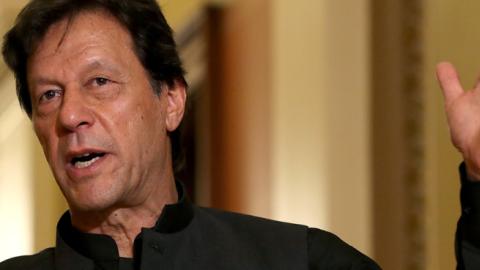Pakistan’s promise of ending jihadi radicalisation at home and militancy in its neighborhood would be more credible if its leaders did not insist on re-writing history to blame others, mainly the US, for Islamabad’s policies.
Prime Minister Imran Khan attempted to hold the US responsible for Pakistan’s use of radical Islamists as an instrument of foreign policy in his recent talk the Council of Foreign Relations in New York. According to Khan, “jihad was glorified” because “helped by the United States, we organised the resistance to the Soviets”.
Imran Khan’s attempt at historic revisionism, of course, is not new. Other Pakistani leaders have made similar assertions. General Pervez Musharraf attributed Pakistan’s jihad problem to the US-supported war and explained its continuance beyond the Soviet occupation of Afghanistan to a ‘proxy war’ with India. Former Pakistan president Asif Zardari also made claims similar to those made by Imran Khan.
The logic behind this revisionist history is that Pakistan and its leaders are not to be blamed for the discovery of Osama bin Laden in Abbottabad or for the presence of dozens of terrorist organisations across the country. The blame should somehow lie with the United States for ‘using’ Pakistan for jihad against the Soviet Union from 1979 to 1989
Pakistan establishment’s real problem
This attempt to shift the blame from Pakistan’s jihadist policies has several flaws. The jihad against the Soviets ended 30 years ago, and the major figures who participated in it are either dead or very old. The terrorist groups trained and launched for Ghazwa-e-Hind, the battle for India, had little to do with the anti-Soviet struggle in Afghanistan.
The Kashmir-related groups were purely Pakistan’s creation and most of the major leaders in the Kashmiri jihad had no significant roles in the battles waged in Afghanistan against the Soviets. None of them received training or equipment from the Americans. Some of these groups have had several incarnations despite successive governments saying they would ban them.
Instead of shutting these groups down, Pakistan’s officials simply want to deceive or confuse the rest of the world about their existence. For example, only two weeks ago, a US-designated terrorist, Fazlur Rehman Khalil, appeared on stage in Islamabad with Pakistan’s special assistant to the PM on information at a Kashmir solidarity conference.
The story of his sharing the stage with Imran Khan’s cabinet member was carried by the state-run Associated Press of Pakistan only in its Urdu service. Last year, Khalil had campaigned alongside Imran Khan’s former finance minister Asad Umar, and the press reported he had joined Khan’s Pakistan Tehreek-e-Insaf (PTI). The report was contradicted next day in the English-language press because foreign diplomats and outside analysts are most likely to read news on English-medium websites.
Khalil was a co-signatory of Osama bin Laden’s 1998 declaration of war against the United States and has continued to operate freely over the years even as Pakistan promised action against him. The effort to hide him from foreigners while allowing him to campaign alongside cabinet ministers indicates that Pakistan’s establishment sees overseas exposure of jihadis, not their existence, as the real problem.
Pakistan’s jihadist history
Fact is that jihad, which remains part of the Pakistan army’s credo – Iman, Taqwa, Jihad fi Sabil Allah (meaning Faith, Piety, Jihad in the path of Allah) – has been one of the defining elements of Pakistan’s state ideology. Covering that up before foreign audiences with abridged accounts of history implies that Pakistani leaders do not want to acknowledge and confront the problem. They would rather sweep it under the carpet.
The anti-Soviet jihad, generously assisted by the Americans, came after Pakistan had already established a tradition of mustering irregular forces inspired by Islamic sentiment. In my book Pakistan Between Mosque and Military, I have cited extensive evidence of how Pakistan’s civil and military leaders repeatedly offered Pakistan’s services to the West in return for economic and military aid.
Pakistan's first finance minister (and later Governor-General), Ghulam Muhammad, had proposed the creation of an ‘Islamic barrier to the Soviets’ with the help of US intelligence as far back as 1949. Afghan mujahideen leaders Burhanuddin Rabbani and Gulbuddin Hekmatyar set up shop in Peshawar in 1973, six years before the Soviet invasion of Afghanistan. And, after the invasion in 1979, the idea of jihad against the Soviets was mooted to the Americans by Pakistan’s then-military dictator, General Zia-ul-Haq, not vice-versa.
Pakistan’s jihadist history began with the organisation of tribal lashkars in 1948 for Kashmir. It continued with Field Marshal Ayub Khan’s call for jihad against India in 1965, backed by Zulfikar Ali Bhutto’s call for a “thousand-year war” and the 1971 mobilisation of mujahids and razakars to subdue Bangladesh liberation struggle in erstwhile East Pakistan.
Ayub Khan’s Bureau of National Reconstruction had proposed ‘irregular warfare’ as the solution to the country’s security problems. Aslam Siddiqi, a senior official in that bureau, explained in his book Pakistan Seeks Security (1960. Lahore, Longmans Green): “Irregular warfare can help in reducing the crucial nature of the initial battles of Pakistan. It can help in spreading out prolonging action. The essence of this irregular warfare is to deny the enemy any target and keep attacking him again at unexpected places.”
The anti-Soviet Afghan jihad expanded the scale of Pakistan’s ability to wage ‘irregular warfare’. The influx of American and Middle East money enabled the enlargement of the Inter-Services Intelligence (ISI) into a formidable organisation. It also improved the quality of weapons, other equipment, and training available to the jihadis. But it was by no means the beginning of Pakistan’s involvement with jihad. And denying history, and the misdirected ideology behind it, will certainly not help end the misadventure and its debilitating consequences.
Read in The Print

















